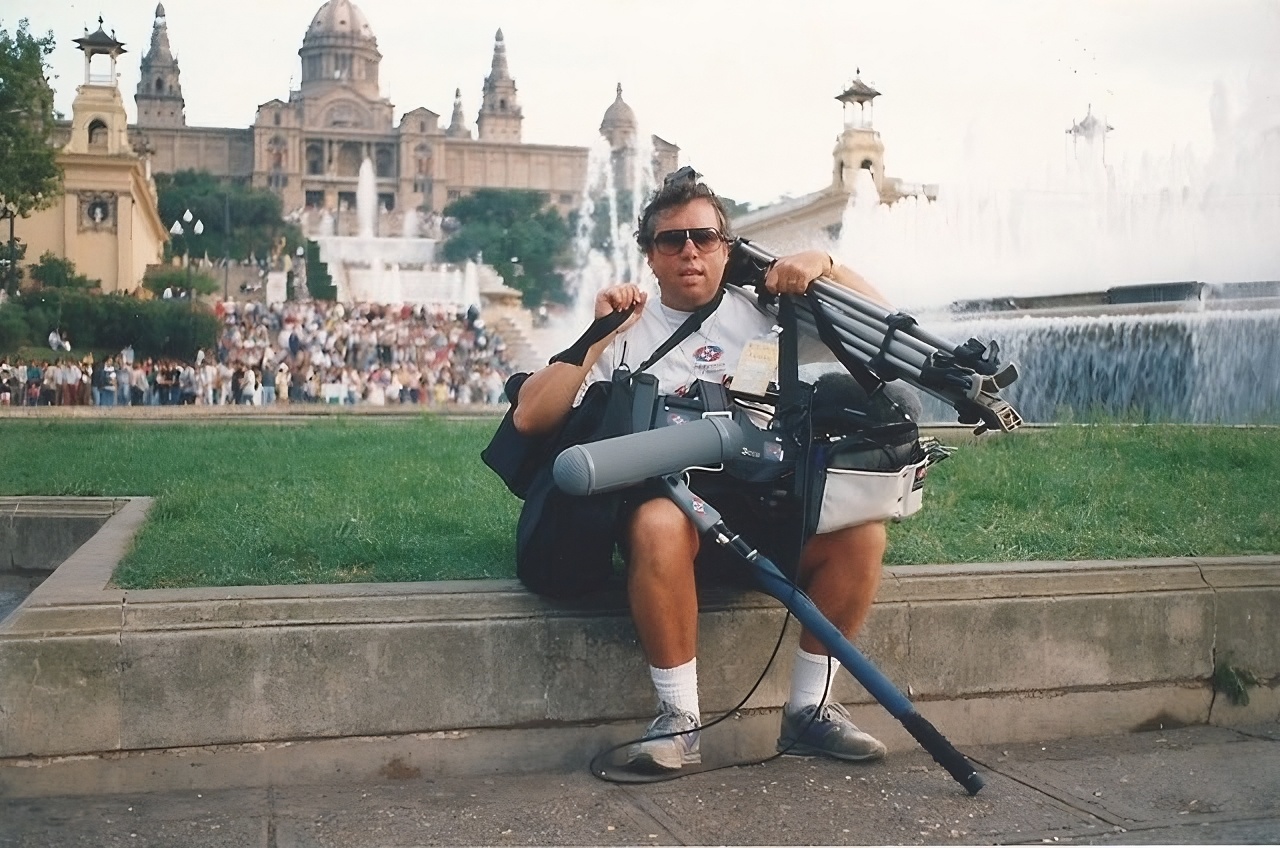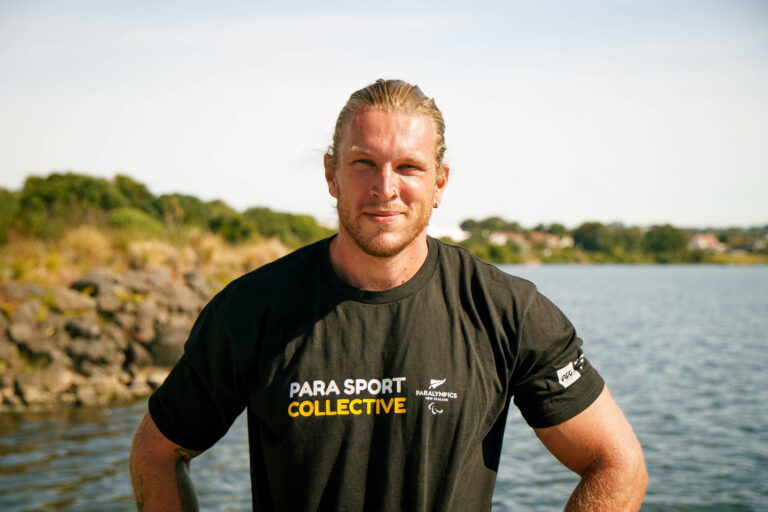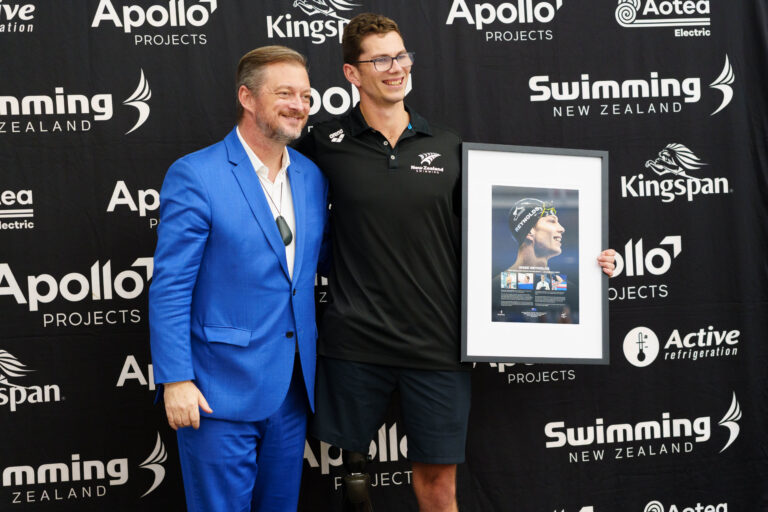TVNZ’s exceptional coverage of the Paris 2024 Paralympic Games makes it difficult to imagine a time when such comprehensive broadcasting of the Paralympics was not the norm.
Yet a little over 30 years ago, the Paralympic Games created hardly a ripple in Aotearoa New Zealand and perhaps few men have done more to showcase the event as award-winning documentary maker Chas Toogood.
A visionary director and producer, Chas was the man behind groundbreaking TVNZ documentaries of the Barcelona 1992 and Atlanta 1996 Paralympic Games, which for the first time beamed the feats of the NZ Paralympic Team into millions of Kiwi homes.
Acknowledging the wide-ranging appeal of the Paralympic Games, Chas was later instrumental in bringing one-hour daily highlights packages onto the TVNZ schedule of the Sydney 2000, Athens 2004 and Beijing 2008 Paralympic Games.
Reflecting on his long-standing association with the Paralympic Games, Chas is eager to play down his role in advancing the Paralympic Movement, but he is clearly proud, nonetheless.
“I’m overjoyed when I put on the TV today and see a Paralympian featuring on an advertisement, because it signals the profile that our Para athletes and the Paralympics has today,” explains Chas from his home in Papamoa. “Back in Barcelona (1992) hardly anyone in New Zealand had heard of the Paralympic Games but today our Paralympians are household names. I don’t claim any credit for that, I just loved my work, the Paralympic Games and the Para athletes I worked with. All I did was put the Paralympic Games on the telly.”
Modest and self-effacing, Chas, 75, is not one to blow his own trumpet but his passion for the Paralympic Games, storytelling ability and vision undoubtedly gave the Paralympic Movement a platform it had never previously enjoyed in Aotearoa New Zealand, and ushered in a new era.
Chas began his journalism career on the Hawke’s Bay Herald Tribune before later transitioning to radio and TV – where he discovered a passion for telling stories with pictures.
It was during a period working as a reporter for the regional news TV show Top Half he found a fondness for telling longer form stories which acted as the trigger to later move into documentary making.
Working as a producer for Paul Holmes – one of New Zealand’s most iconic broadcasters of his generation – added to Chas’ career experiences, and it was through Holmes he was introduced to Para sport and the Paralympic Games.
While working in Europe, Holmes worked as a reporter at the Arnhem 1980 Paralympic Games. Covering the fortunes of the NZ Paralympic Team kick-started his long-time advocacy for the transformative power of Para sport and the Paralympic Games.
When Holmes approached Chas to ask if he was interested in being the producer and director of a documentary on the Barcelona 1992 Paralympic Games, he leapt at the opportunity.
“Most people introduced to Paralympic sport fall in love with it and that’s what happened to me,” he explains. “I recall that in the 1990s the Olympic Games had become quite commercial whereas the Paralympic Games felt pure. The Para athletes were simply there for themselves to compete. Barcelona 1992 helped bring about a 16-year love affair for me with the Paralympic Games.”
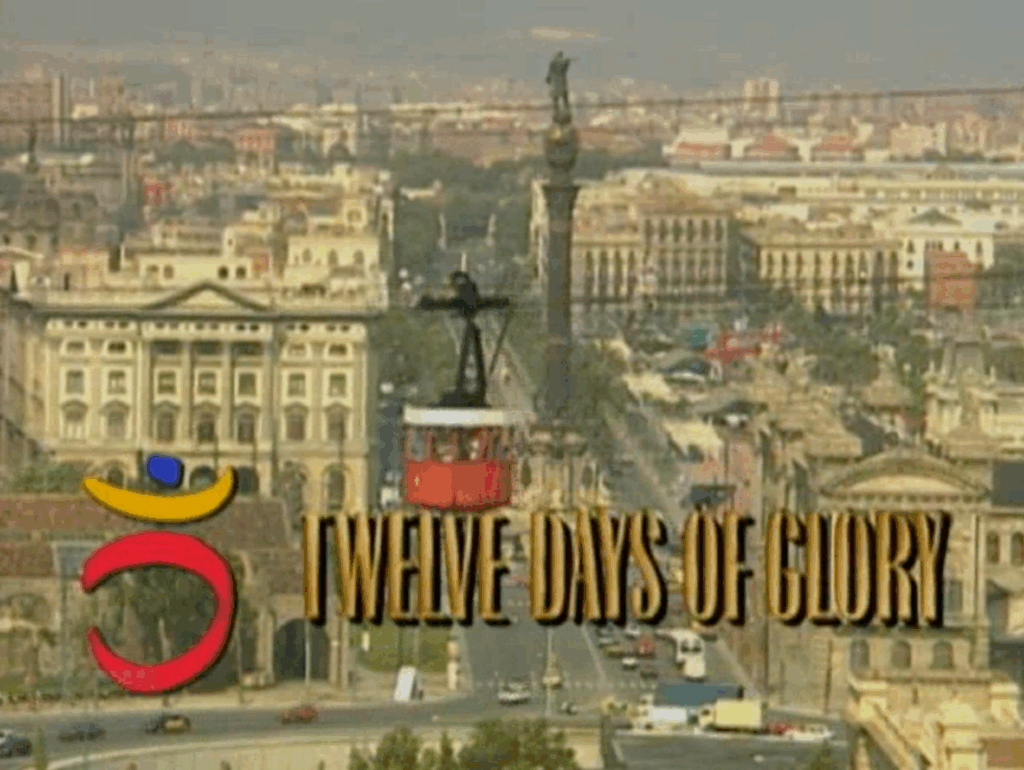
The hour-long documentary entitled Twelve Days of Glory followed the fortunes of the NZ Paralympic Team in Barcelona – led by Paralympian #81 Jenny Newstead MBE, who claimed four gold and one silver medal in the pool, and Women’s 100m TW2 champion Paralympian #82 Cristeen Smith.
Holmes’ standing within New Zealand broadcasting gave the documentary instant credibility, but it would not have been possible without the immense support given by Paralympics New Zealand (PNZ), the Paralympians and the wider Para community.
“They were all amazing,” says Chas. “All the Paralympians were so open and very appreciative that we were present to share their stories to the New Zealand public.”
Chas and the team successfully shone a light on their respective sporting journeys, but also did not shy away from their challenges.
“We showed that Dave MacCalman (Paralympian #80 MZMN) who was a wheelchair user, might take him two hours to get organised. This showed the level of commitment that Paralympians require to be able to deliver at the highest level.”
Admitting back then to naivety regarding TV rights and restrictions, he laughs now at how one of his camera operators dodged the rules by joining the NZ Paralympic Team on the track during the Opening Ceremony at Barcelona 1992. Requesting footage of the Team as a means of introducing the various individuals who would feature in Twelve Days of Glory, Chas adds: “I had no clue back then of TV rights, we just went happily along. It was probably a bit naughty to enter the track, but no one stopped us or spoke to us afterwards, so I presumed everything was fine.”
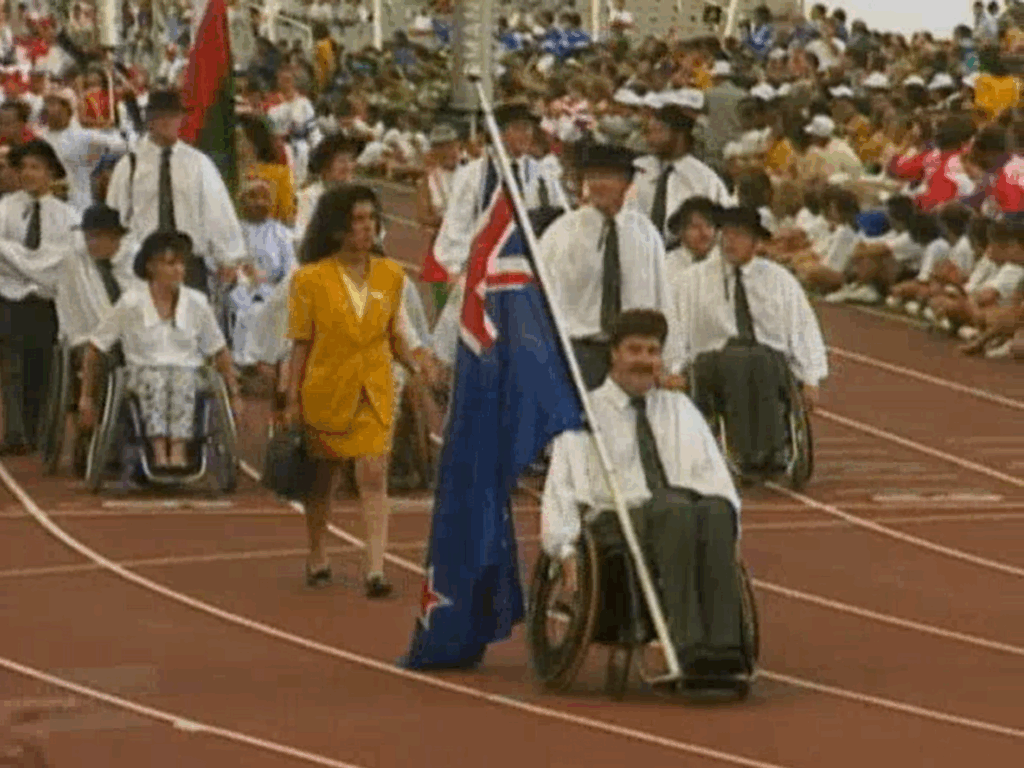
Gathering the footage he required, Chas said that filming went as smoothly as he could have anticipated in Barcelona. Although he does wince at one incident involving Cristeen Smith ahead of her final of the Women’s 200m TW2.
“Cristeen will kill me for saying this, but she could be very intense ahead of a competition,” explains Chas. “She was fantastic to work with, but she said, ‘please don’t approach me ahead when I’m getting ready to go out and compete’. For some reason my cameraman did not get the message and as she was wheeling on to the track for her 200m final he started talking to her. Unfortunately, it did not work out for her in that event (she was disqualified) and she blamed us. I understand why she was angry, although in her next event, the 100m, she won gold, and we were friends again. It was certainly a mistake we never again repeated.”
Following the Games, Chas spent a three-week stint editing the footage. Back then, editing was both physically and mentally demanding – a process not made easier as the only slot available to his team in the TVNZ editing suite was between midnight and 8am.
Following his nocturnal existence during editing, Twelve Days of Glory was finally aired on TVNZ in late 1992 to huge acclaim.
“The reception was amazing,” recalls Chas. “People immediately wanted to know why they had not seen the Paralympic Games before or more of it. The public were blown away.”
For Paralympian #96 Duane Kale ONZM watching Twelve Days of Glory had a profound impact on his life. Having only recently been paralysed following an operation on a spinal tumour, Duane says watching the documentary provided “the catalyst” for his sporting future.
“Before watching Twelve Days of Glory I had no idea of the Paralympic Games, but to see the pinnacle event for disability sport was the prompt for me to get involved.”
“Watching the documentary, what also struck me was the amazing Para athletes New Zealand had competing plus the incredible support, which is still apparent today. For me it was the beginning of something quite magical.”
With the public demanding more, it was a “no-brainer” that Chas and Holmes created a follow up hour-long documentary at the Atlanta 1996 Paralympic Games entitled Triumph of the Human Spirit.
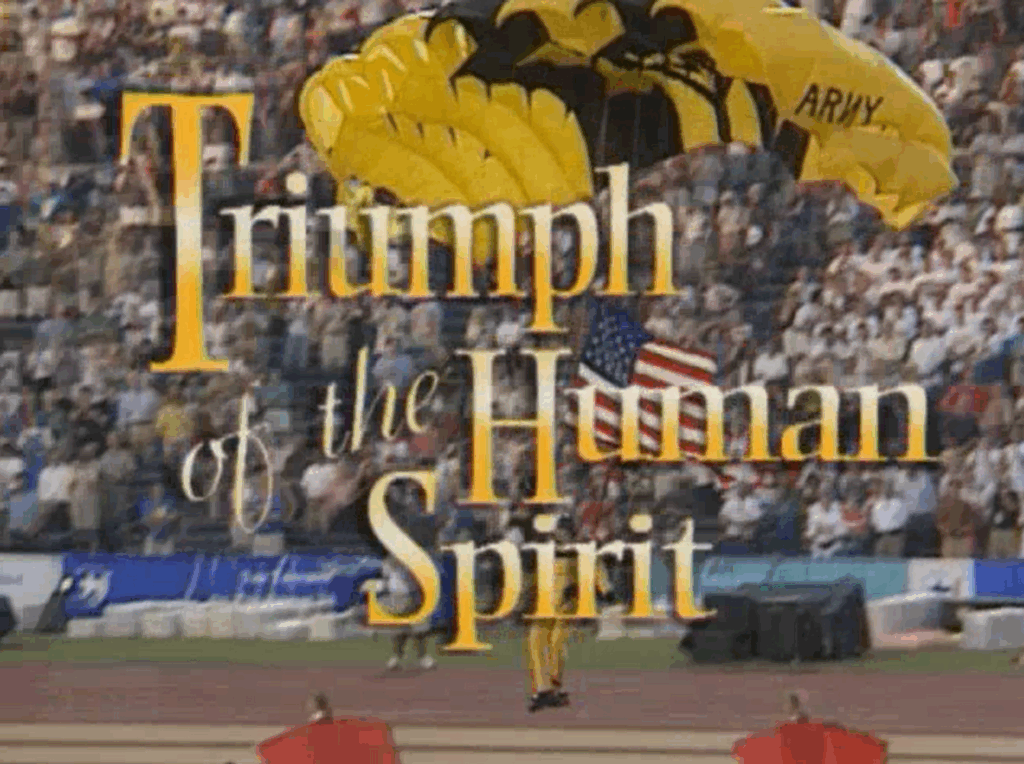
Following a similar format, the documentary once again proved a huge success, although Chas had identified from four years earlier a noticeable evolution in the Paralympic Movement.
“The Atlanta Games were the first in which the prosthetic ‘blade runner’ legs featured,” explains Chas. “Some of the performances were simply incredible and standards were on the rise.”
For Duane Kale – whose interest in the Paralympic Games had been ignited by Twelve Days of Glory – it was “a privilege” to feature in Triumph of the Human Spirit.
On a personal level his debut Paralympic Games went like a dream. Banking a haul of four gold, one silver and one bronze medal, the Para swimmer was the star performer in a NZ Paralympic Team which claimed a total of 18 medals including nine golds.
And while he delivered his personal goals inside the Georgia Tech Aquatic Center, he was also delighted to contribute to Triumph of the Human Spirit.
“I was first and foremost there to compete, but the documentary was a nice distraction,” explains Duane. “To work with iconic people such as Paul Holmes and Chas Toogood was neat and they made the whole process so easy and relaxed. Looking back, the documentaries helped raise awareness of the Paralympic Games and Para sport and helped create some societal shifts.”
On his return home via Napier Airport, he discovered firsthand the rising impact of the Paralympic Games. Arriving with Paralympian #111 Sholto Taylor, who claimed a bronze medal in Wheelchair Rugby, the pair were greeted by hundreds of people, enjoying a flyover and a parade through the city.
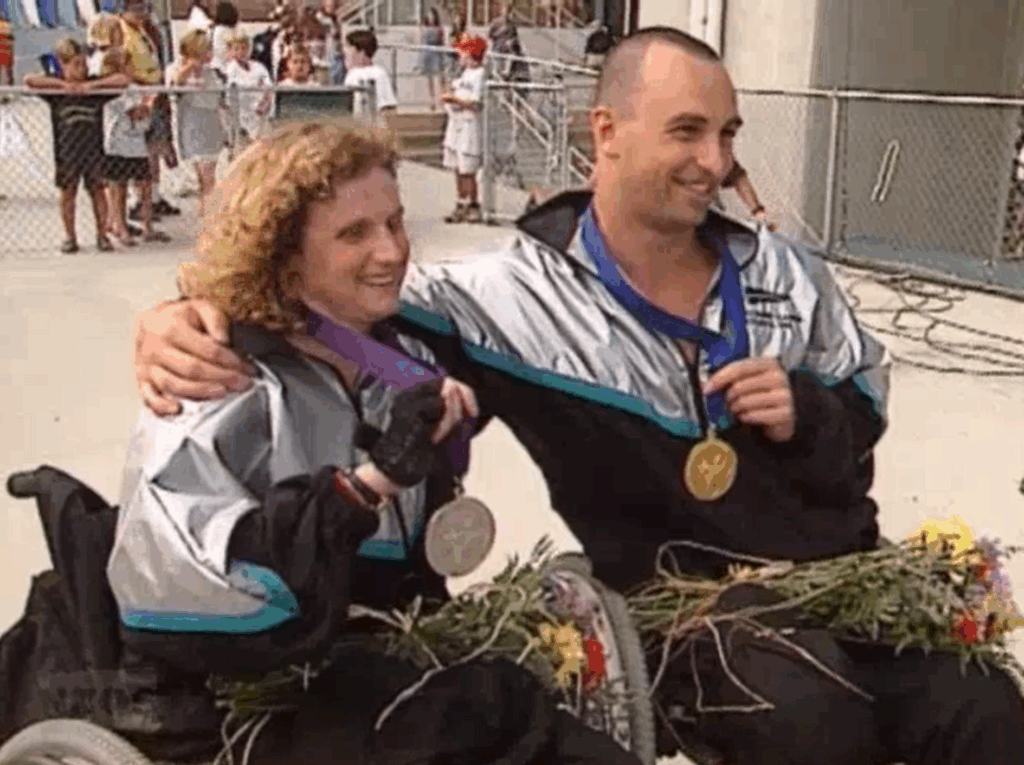
Following the success of Twelve Days of Glory and Triumph of the Human Spirit it would have been easy for Chas to repeat the formula for success and create a third documentary for Sydney 2000, but showing uncanny vision, he acknowledged the need to change up the broadcasting strategy.
“It needed to be more than just ‘wow, aren’t these people amazing.’ The event needed to be covered like the huge sporting event it is,” explains Chas.
“I pushed for hour long highlight packages of the Sydney 2000 Paralympic Games on TVNZ, which was a big step because for the first time we brought in experienced and well-respected commentators such as Keith Quinn and Brendan Telfer.”
“Previously on the global feed you would see just the wide shot of the field and only if a New Zealander won would you get that tight shot of their reaction. What we did in Sydney was take both the global feed and a camera following the Kiwis to give the best possible coverage.”
What had been three nights a week of one-hour highlights packages in Sydney stepped up to four or five one-hour highlights shows a week at the Athens 2004 Paralympic Games. By Beijing 2008 – with Chas producing the shows – coverage on TVNZ had advanced to daily highlights with coverage fronted by Geoff Bryan and supported by iconic commentators Keith Quinn and John McBeth.
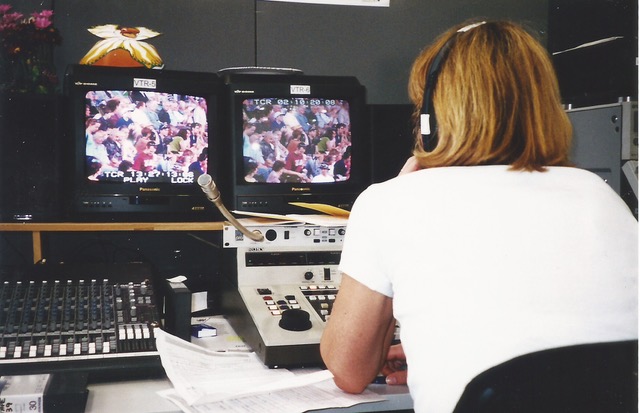
“By Beijing 2008 the broadcasts were fantastic,” he explains. “We had great support from Paralympics New Zealand, Duane was the Chef de Mission in Beijing, and it was the first time we saw Dame Sophie Pascoe (Paralympian #166 DNZM) excel at a Paralympic Games.”
The Para athletes were now central to the broadcasting of the Paralympic Games, while sports writers were finally giving the Paralympic Games the attention the event deserved, a shift Chas wholeheartedly applauded.
Following his retirement Chas has witnessed a further evolution in coverage of the Paralympic Games, which in its most recent iteration in Paris 2024 boasted a comprehensive multi-channel broadcast which included five pop up channels on TVNZ+.
Proud of how he has supported the Paralympic Movement, the documentary maker also acknowledges how the Paralympic Games enriched his life.
“Working on the Paralympic Games was the highlight of my 50 years working in TV,” he admits. “Every four years I looked forward to working on the Paralympic Games. I’ve forged long-lasting friendships in the Para sport community, and it opened so many aspects of my life.”
But the final word belongs to Duane Kale, now Vice President of the International Paralympic Committee (IPC), who salutes the pivotal role Chas played in elevating the Paralympic Movement here in Aotearoa New Zealand.
“Chas could see something years before others by showcasing people with a disability doing extraordinary things in elite sport,” explains Duane. “The nightly highlights packages of the Paralympic Games attracted the highest rated shows ever for the 5-6pm slot on TVNZ. Did that mean it captured a nation? You bet it did.”

